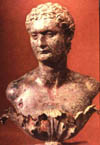The Life of Statius
Statius the Man
Publius Papinius Statius was born in Naples around the year 45 A.D. Very little is recorded about his life and most of what is known is gleaned from his own writings. So little was known about Statius, that during the Middle Ages he was confused with a rhetorician from Toulouse named Lucius Ursulus Statius, and was mistakenly named Papinius Sursulus Statius. The confusion was cleared up when the Silvae, a collection of Statius' poems all but unknown from around the end of the sixth century, was rediscovered by Poggio Bracciolini in 1417. It is from the Silvae that a biography of Statius could be constructed.
Statius was happily married to a lady named Claudia, but had no children of his own. He adopted a son who apparently died young. His wife had a daughter from a previous marriage, and Statius writes affectionately of her. He only mentions his mother once, and very little is known about her. His father, however, played an important role in his life and Statius clearly owes his career in poetry to him. Also named Publius Papinius Statius, his father was a well-educated man from a respectable family, and passionately devoted to Greek literature. Also a poet, he won some prizes in poetry contests, and Statius writes with pride of his accomplishments. As a respected schoolmaster and a poet, he introduced Statius to the upper classes and encouraged his poetry.
 |
Emperor |
Statius had many patrons, and although not wealthy, did not live in poverty. He lived in Rome most of his life and was a court poet under the emperor Domitian. He enjoyed some success in public recitations and poetic contests in Rome, winning the poetry prize at one of Domitian's annual festivals around 83 A.D. However, in 94 A.D. he complains of being unsuccessful at the Capitoline contest, considered the greatest of the declamatory contests in Rome. His disappointment at failing to win the coveted oakwreath, combined with ill health, lead to his return to Naples where he died around 96 A.D.
Statius the Poet
Statius is one of the principal epic and lyric poets of the silver age of Latin literature. He was much esteemed during his own time and through the Middle Ages. Some considered him second only to Virgil among Latin writers, while others have criticized him for the degree at which he imitates Virgil. His works include the Thebaid, the Silvae and the incomplete Achilleid.
Statius wrote these works during the reign of Domitian, who succeeded to the throne on the death of his older brother Titus, in 81 A.D. The emperor Domitian was reputedly a tyrant, and his last years of rule brought about a reign of terror. Under his reign, freedom of speech was curtailed, and all speeches were prefaced with extravagant flattery to the throne. Statius had no choice but to ascribe to the flattery of Domitian. However, it is unknown what his true feelings toward the emperor were, as he died either just before Domitian's death or shortly thereafter.
During this time period it was popular for poets to recite their poetry to audiences. Since Statius was accustomed to reciting for his father's friends and clients, it is possible that his works were originally written for recitation. This does not in any way detract from his writings, and Slater, a translator of Statius' works, describes the Thebaid as a "very brilliant monument, of technique" (18). Furthermore, Silvae 5.4, Statius' "To Sleep",is famous and considered one of the best Latin poems ever written. Statius was a great poet and certainly worthy of the recognition that Dante afforded him in the Divine Comedy.
Statius the Christian
Very little was known about Statius before Poggio rediscovered the Silvae in 1417. Literature made slight reference to him, and a small amount of biographical data at the beginning and end of the Thebaid, as well as at the beginning of Achilleid, was all the information medieval audiences had about his life. This gave rise to misconceptions and to conjecture. One notable conjecture was Dante's depiction of Statius as a secret convert to Christianity in Purgatorio. It is considered highly unlikely that Dante was acquainted with the Silvae, and he probably only knew Statius in the guise of Papinius Sursulus Statius, the rhetorician. He had very little to draw from in his depiction of Statius, but as a shrewd reader of Latin epic he must have felt confident that his portrayal of Statius as a Christian would be plausible to medieval readers.
Dante had Statius explain in Purgatorio (XXII.73) that he embraced Christianity due to reading Virgil's Fourth Eclogue. That Virgil was inspired and prophesying of Christ in lines 5-7 of his Fourth Eclogue was a common mediaeval belief. The theory that Statius ascribed to this belief was Dante's invention. Dante found it convenient to his text to have Statius, a poet, convert to Christianity and receive salvation. There is no specific evidence that Statius was in actuality a secret convert.